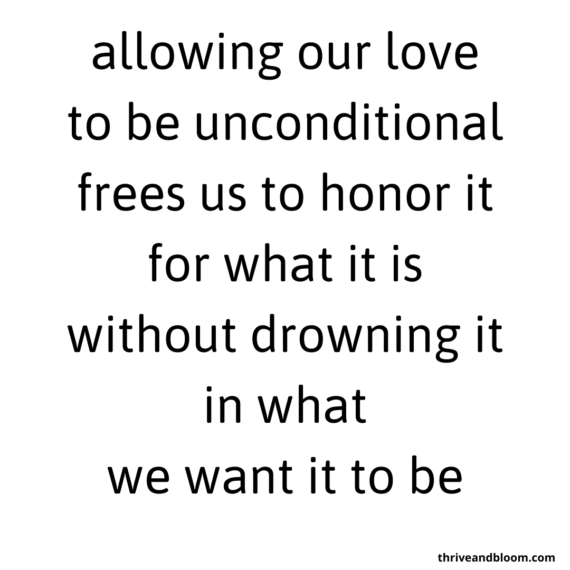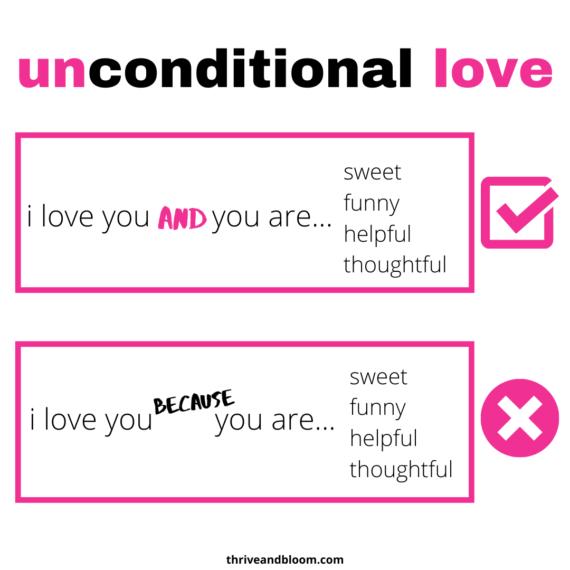We tend to talk a big game about unconditional love, but have you ever stopped to wonder how unconditional your love really is?
One of the threads that ran through the last decade for me was love and, more specifically, unconditional love. I left my marriage in 2010 and, as I grieved the loss of that love and life and explored the contours and colors of what might come next, it occurred to me that love often comes with conditions, even when we think it doesn’t.
Well… to say “it occurred to me” isn’t quite right.
What happened is that somewhere in the midst of a yearslong on-again, off-again relationship that made absolutely no sense and was actually quite painful at times, I realized that I was, in fact, experiencing unconditional love — quite possibly for the first time (consciously, anyway.)
Because there was no “reason” for me to love this person, and certainly not as quickly as I did. I fought the feelings for a long time because of that.
Then, at some point, it hit me. I totally did love that person. From the start. For no reason. Unconditionally.
I mean, I tried to put conditions on it. But they didn’t stick. Which made me feel like a total sucker. This went on for yeaaaars.
To be clear, it’s all a spectrum, right? So yes, part of what was going on was unconditional love and the fallout from forcing conditions that weren’t actually there. But there was other stuff, too. Like believing in the potential of a relationship over the way it actually existed in the world. Like being willing to accept things that really didn’t feel good because of what did. And so on.
But I can’t help to feel that, if I had recognized what was happening as unconditional love sooner, it would have helped me get to the place where I could have accepted that I loved him but that we weren’t right for each other, sooner. (And I would have been able to experience the fullness of the love I felt more deeply until I got there.)
Allowing our love to be unconditional frees us to honor it for what it is without drowning it in what we want it to be.

You see, we’re actually conditioned to love condition-ally. We love people for things. We measure love by what people do for us and what they give to us.
Time. Attention. Kindness. Gifts. Sure, it’s (mostly) the meaning behind the things, but it’s still so often for those things that we love.
He did that for you? Wow, he must really love you.
You’re amazing. I love you so much for that.
She gave you that? Wow, that’s love.
We even do it to ourselves.
With all the work you’ve been doing in the name of self-love, how often do you still love yourself BECAUSE of things?
How often do you follow your declarations of self-love with REASONS for it?
I love myself because I’m awesome.
Because I’m smart, funny, loving.
For all I do for others.
And if you don’t think you do it, I still invite you to explore a little more, just to see for real. To keep your ears and mind tuned to any times you may surprise yourself by following up your expressions of love with something like a “because.”
And then check in with yourself to see how you feel about it.
(There’s no right or wrong way to feel about it, btw.)
You may come to the conclusion that you’re not so interested in unconditional love after all — that you want to be loved for what you do and you believe in loving others for what they do, too.
That is (of course) entirely your prerogative. But I will invite you to be clear and open about it, so that everyone involved is on the same proverbial page.
If you decide that you’d like to take a little of the condition out of your love, you can start by making a simple shift to how you talk about it.
When you notice yourself giving a reason for your love (to someone else or yourself), just pause and swap out the “because” for an “and.” I love you AND you’re so thoughtful.
Or make them two separate statements. I love you. You are so thoughtful.
And remember… if you notice that you’ve been doing this a lot and it bothers you, PLEASE don’t beat yourself up for it. This is how most of us have been taught to love.
If it’s not how you choose to love going forward, you’re well on your way to making that change. And I’d love to hear how it goes for you!

But first… this conversation wouldn’t be complete without talking for a moment about the way we love our kids.
Although I’m a fiercely-loving auntie and well-steeped in the kind of love we educators have for our students, I have no children of my own. So I can’t speak to the giving side of parental love firsthand.
But I will say this: parental love is typically equated with unconditional love, and while I would never EVER doubt the depth or breadth of anyone’s parental love, I respectfully encourage parents to also examine the nuances of their love for possible evidence of conditions they might unexpectedly find there.
And again, to decide how they feel about whatever they find.
So tell me… in the words of Bo Diddley, as popularized for me by George Thorogood in the 80s: Who do you love?
Or perhaps more importantly… how?
If you find yourself in your head a little about all of it, check out this performance that surprised me by showcasing some very true, unconditional love — though not necessarily in the way you may be expecting.
I for one will absolutely be seeking to bring a little more John Hammond energy into my life and loving (especially from about seconds 22-45.)
I’d love to hear what comes up for you around this. Drop your comments here, on FB or IG, or email me. xxoo, cc

